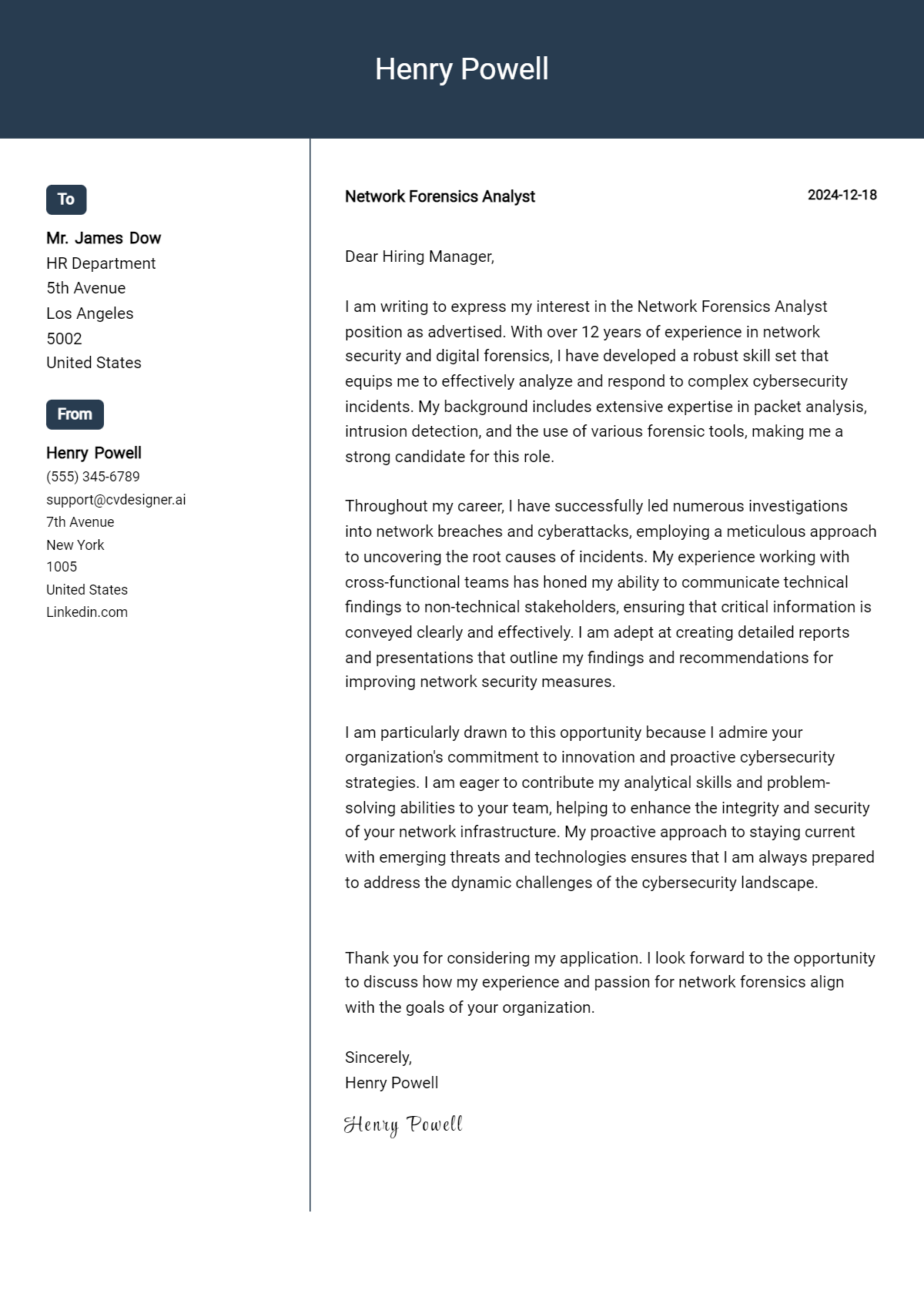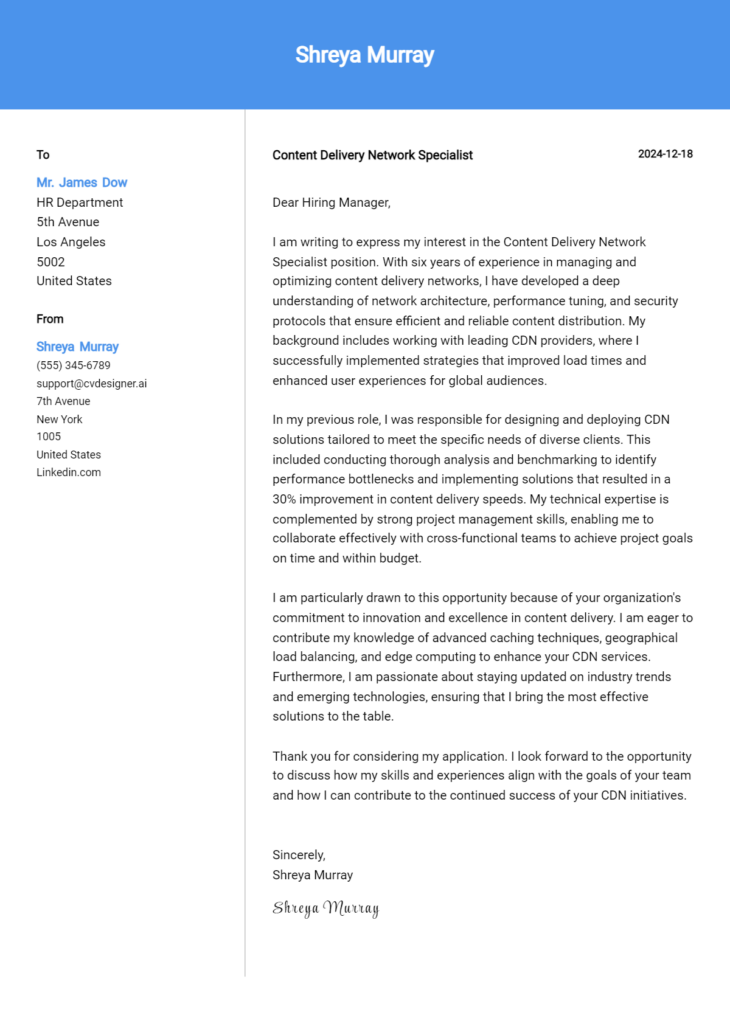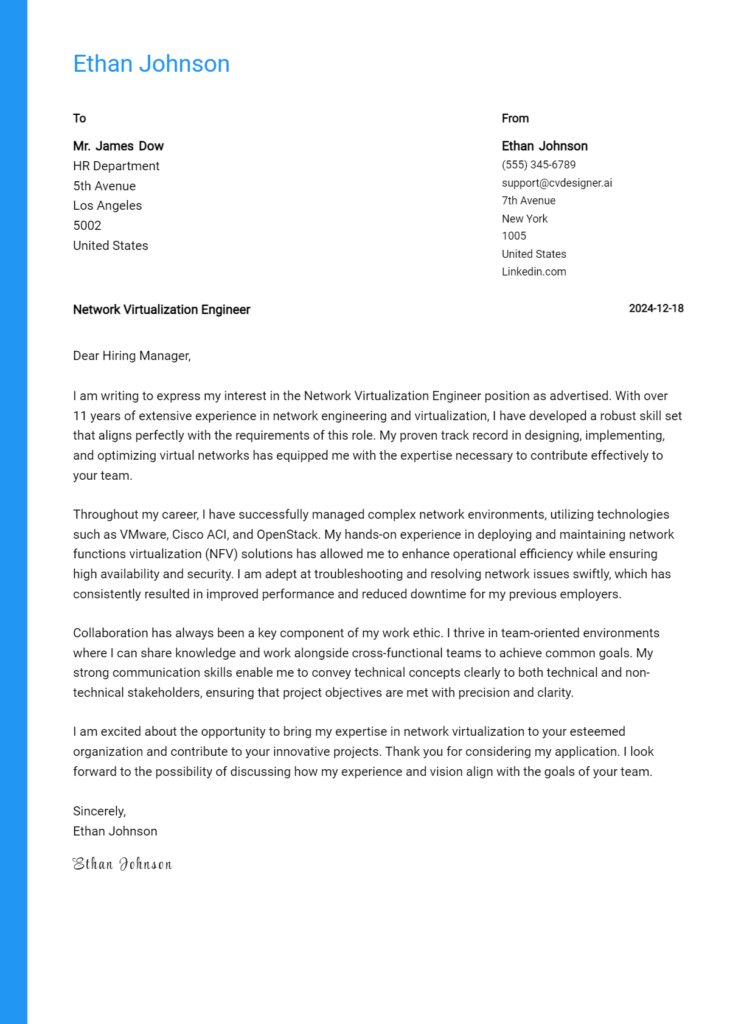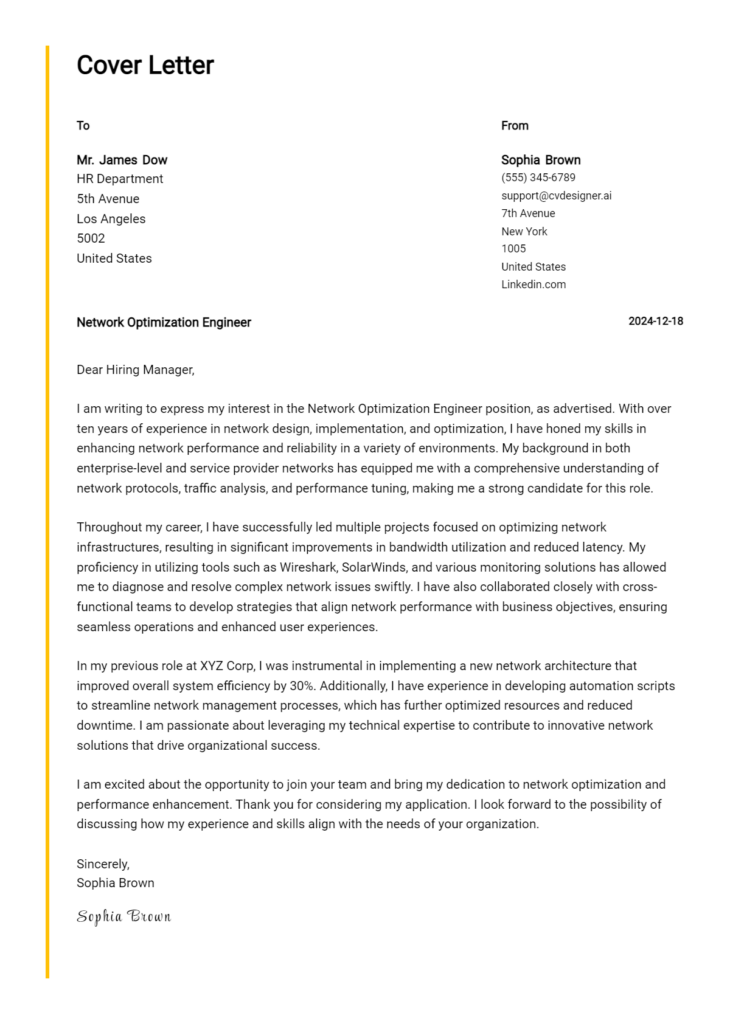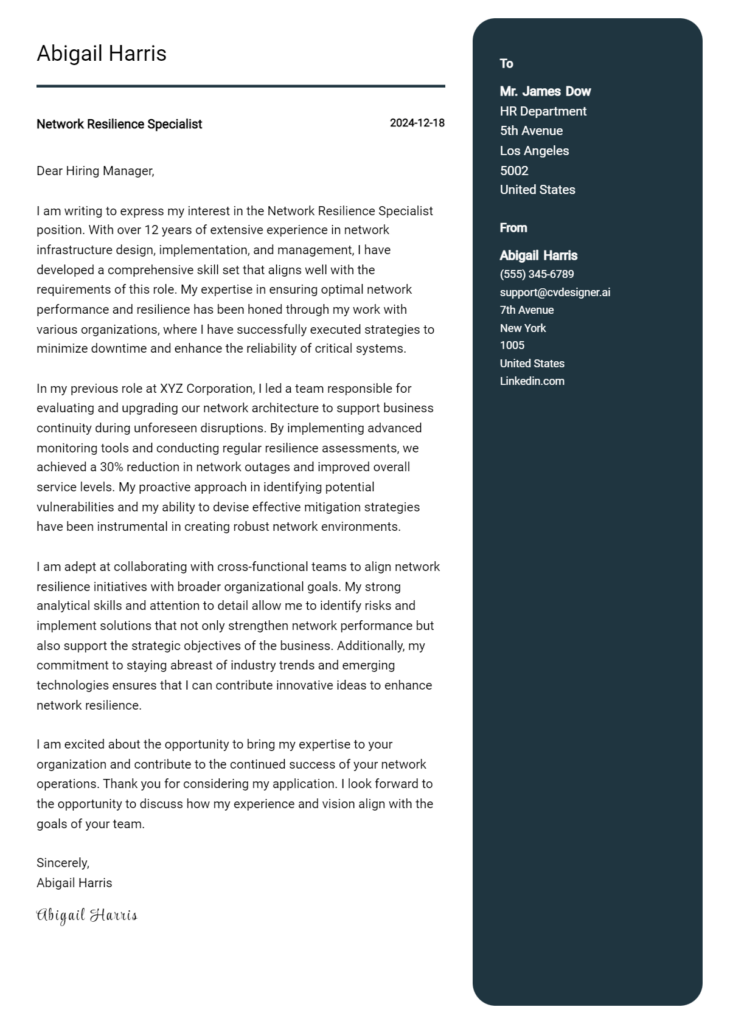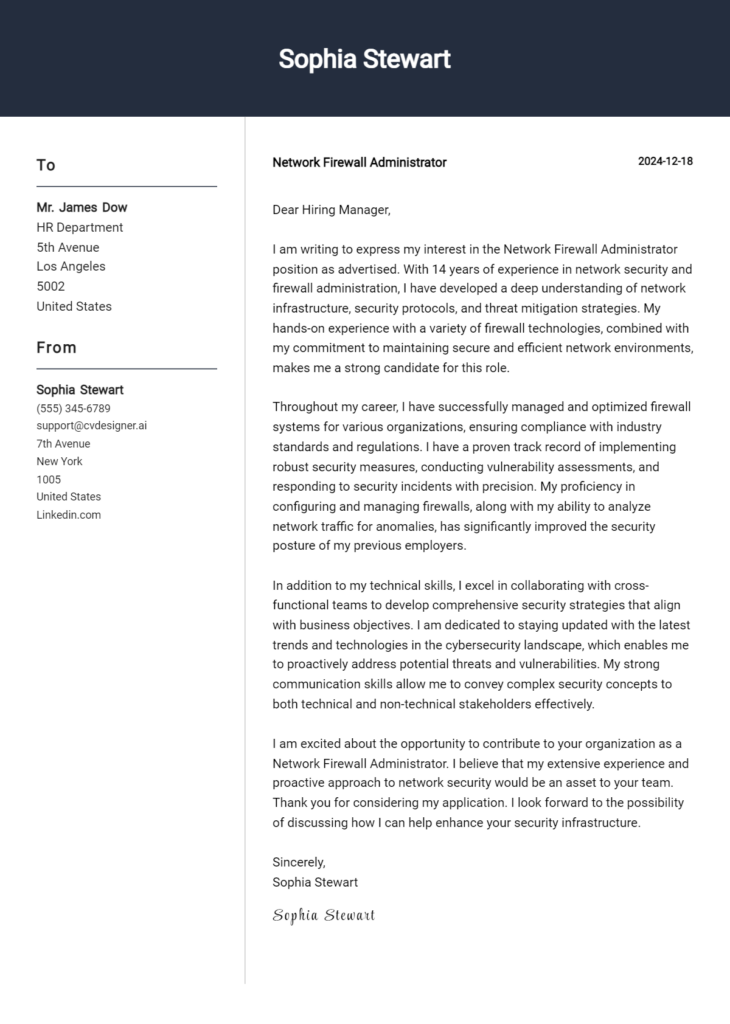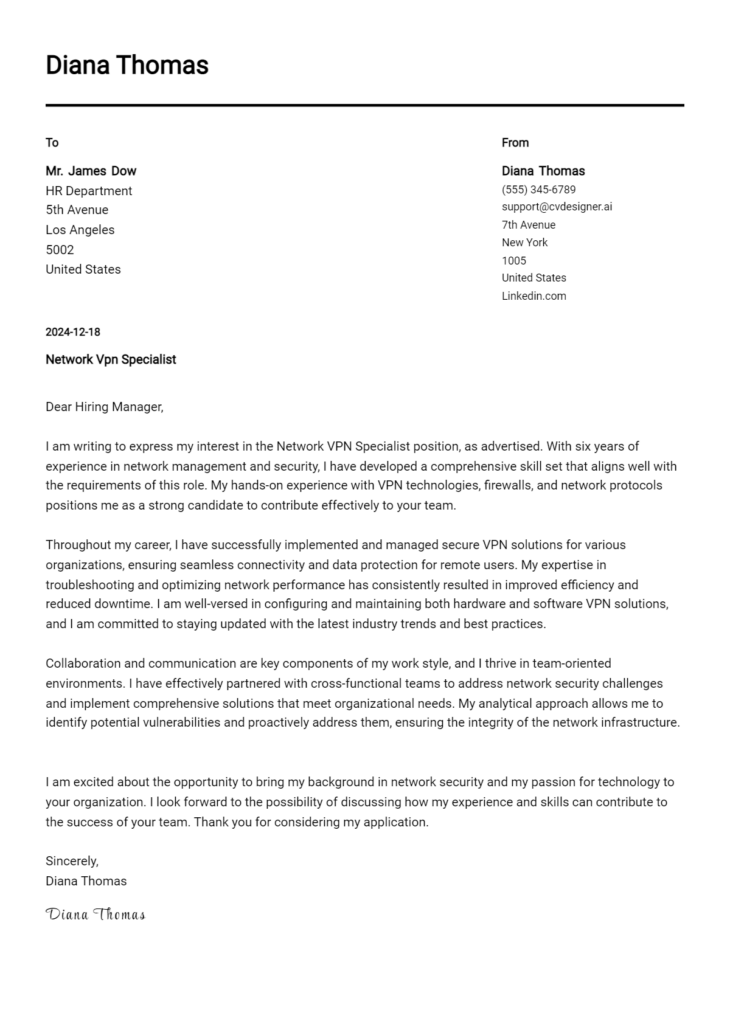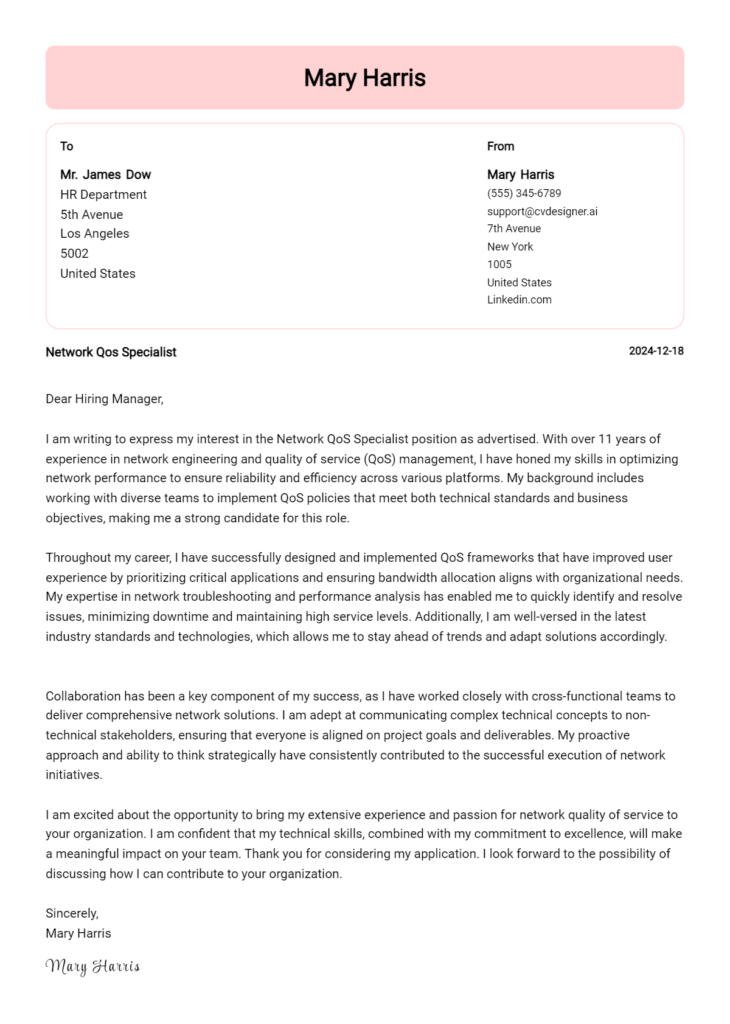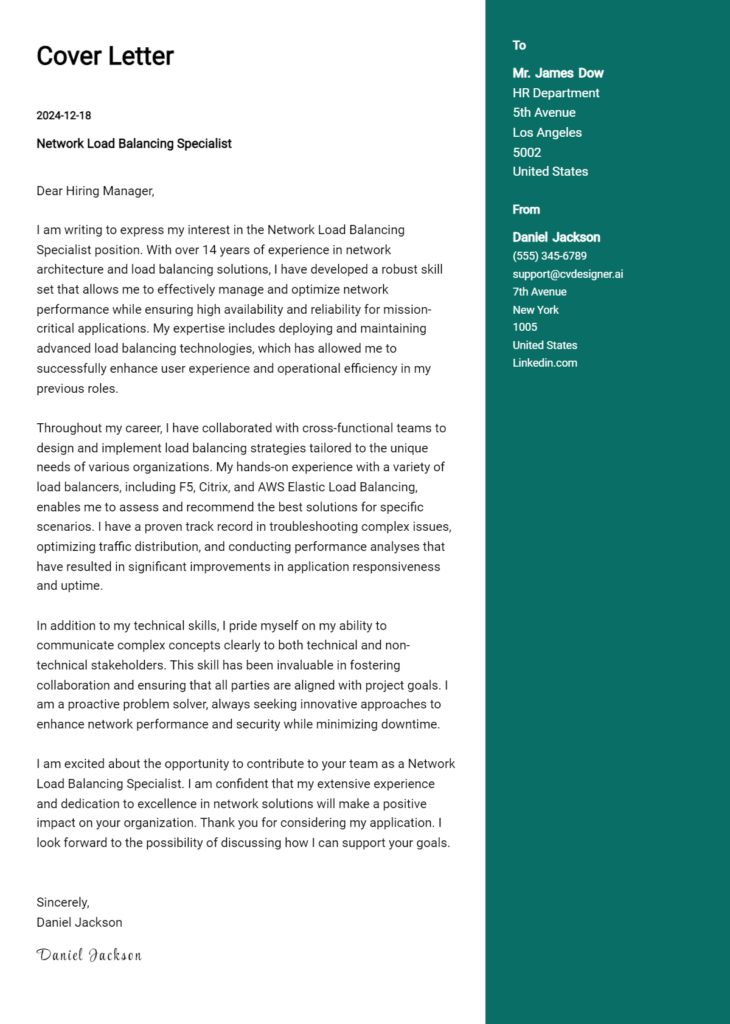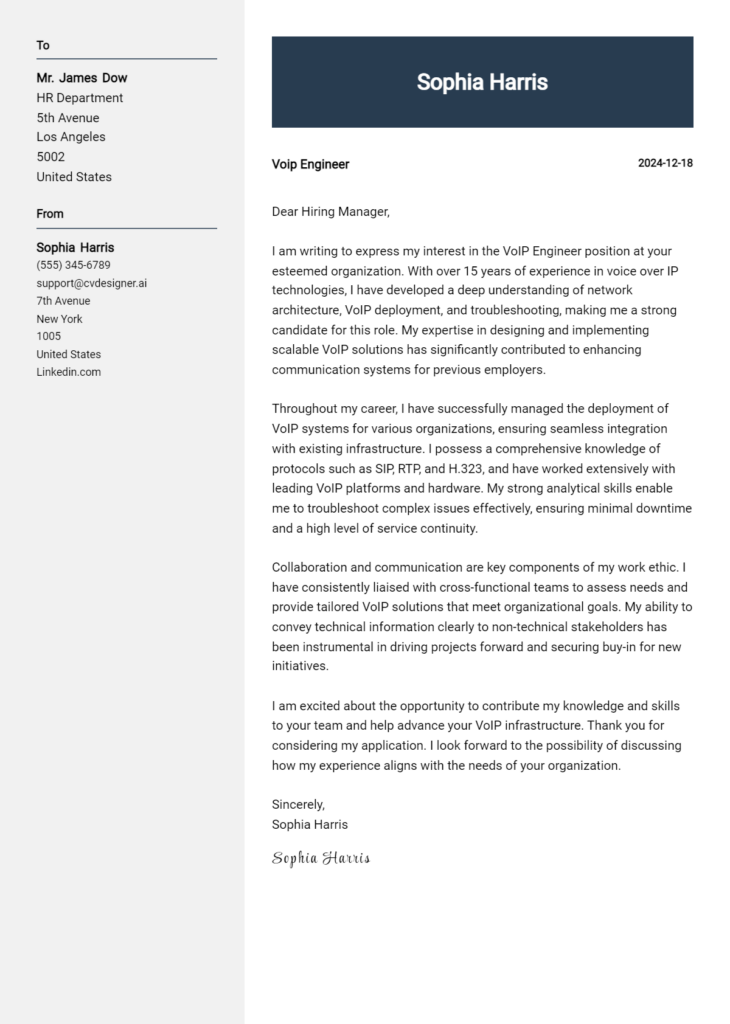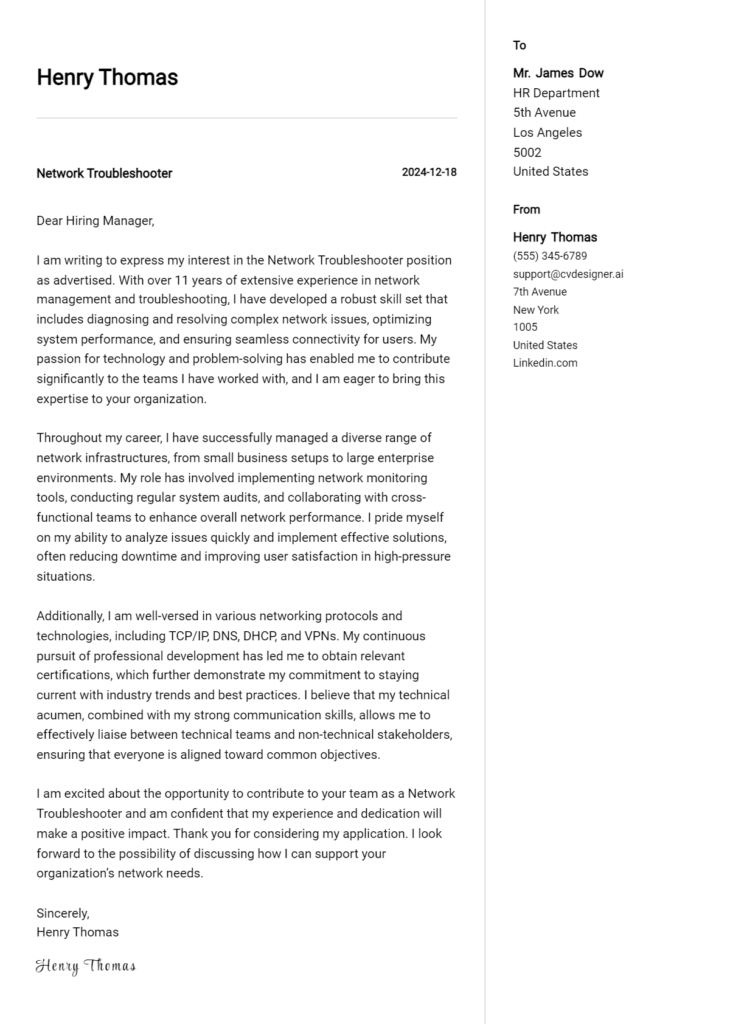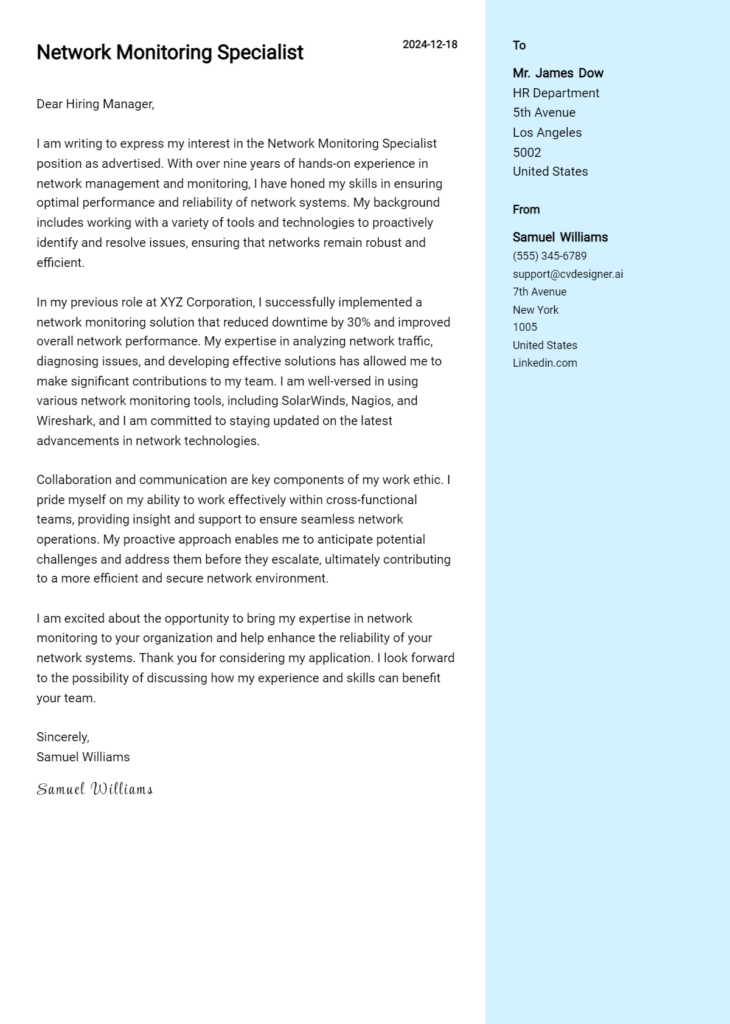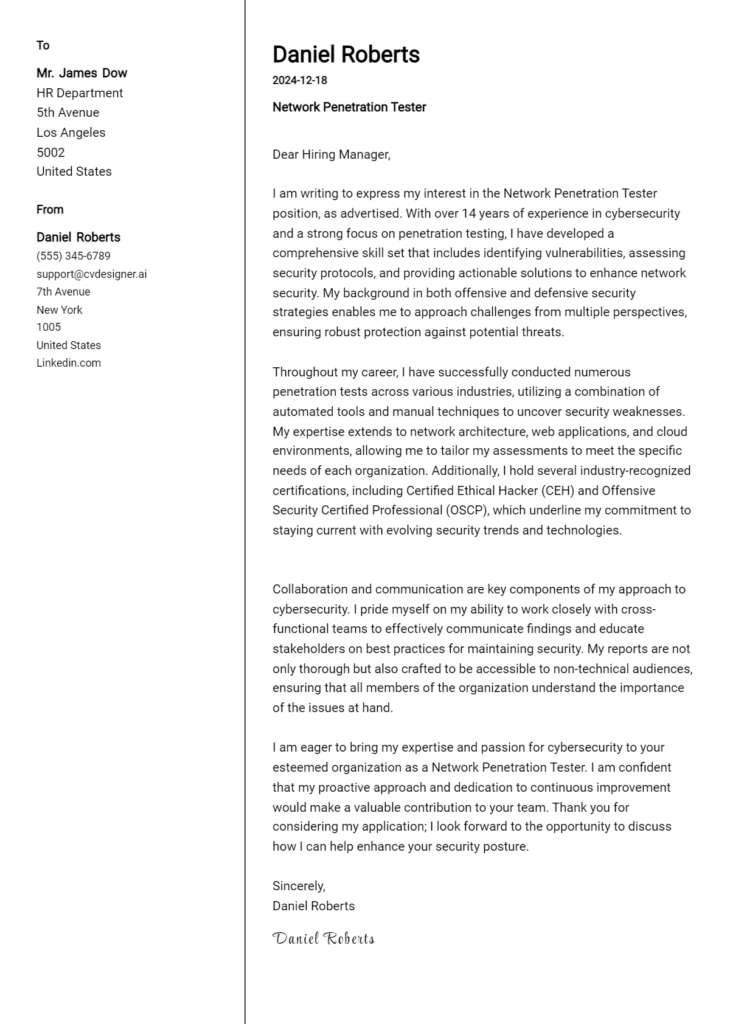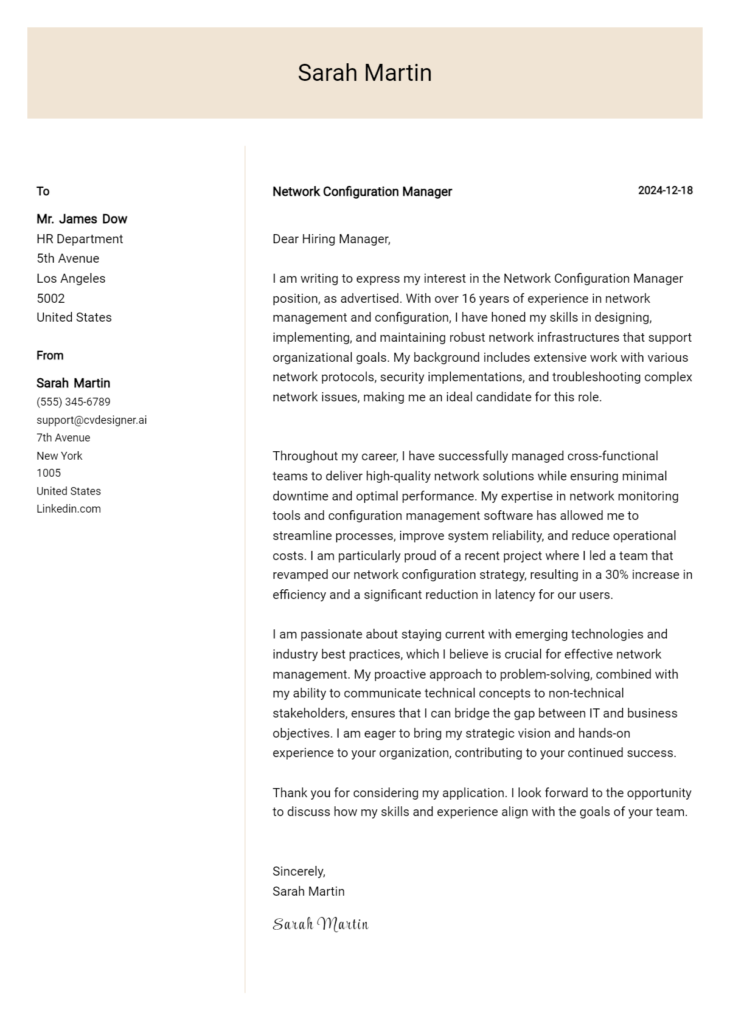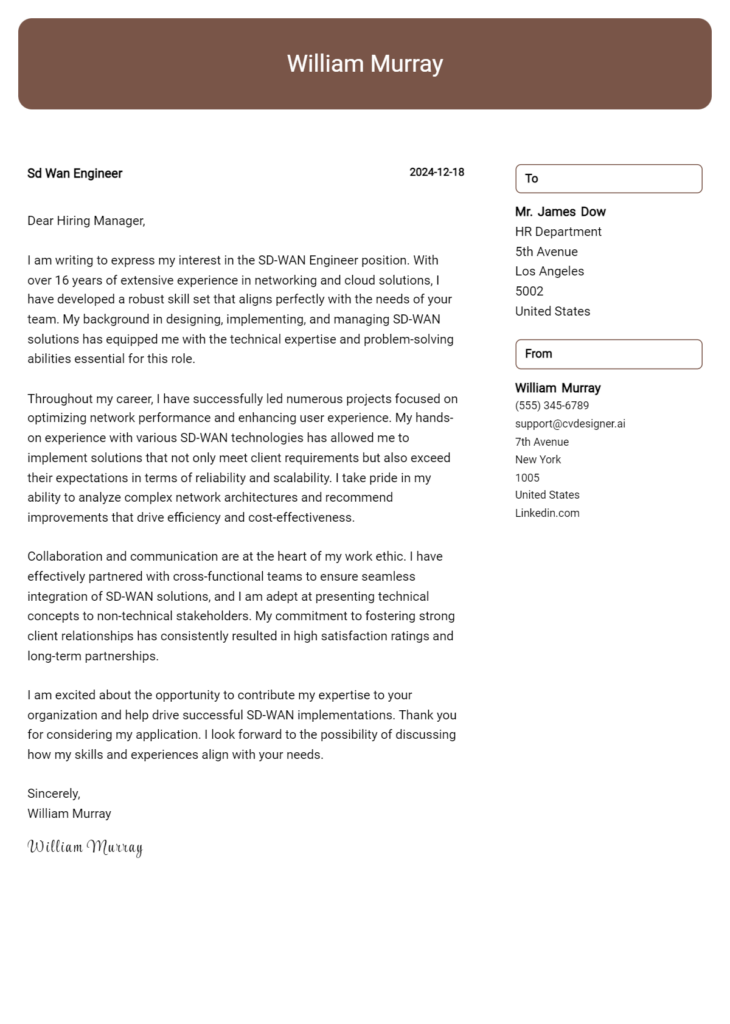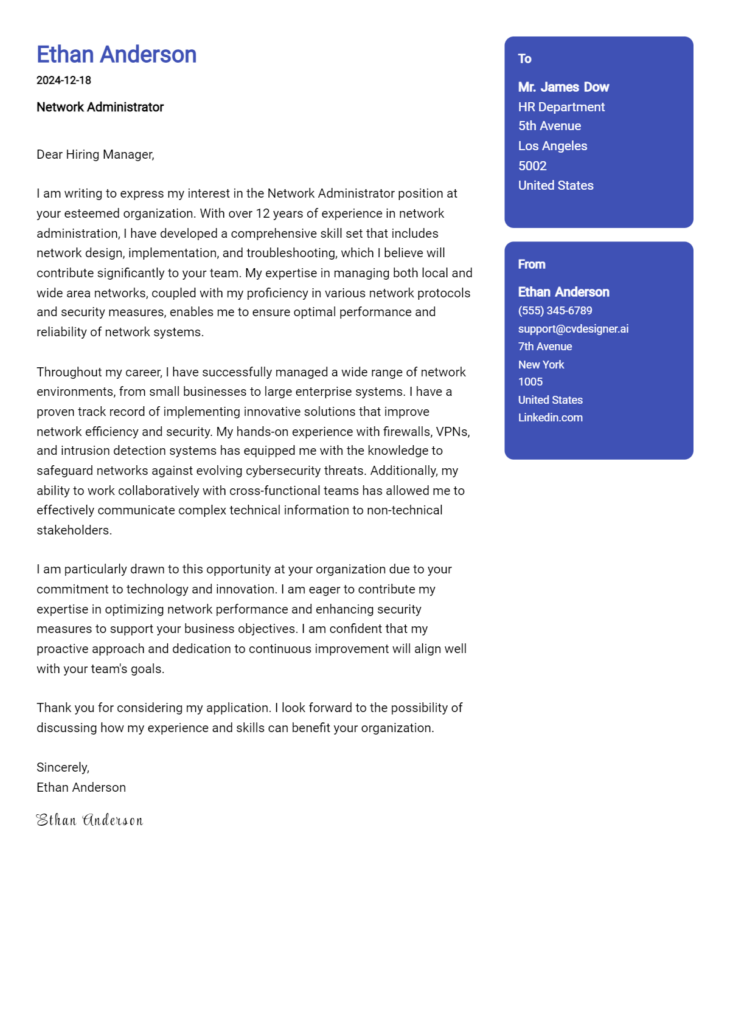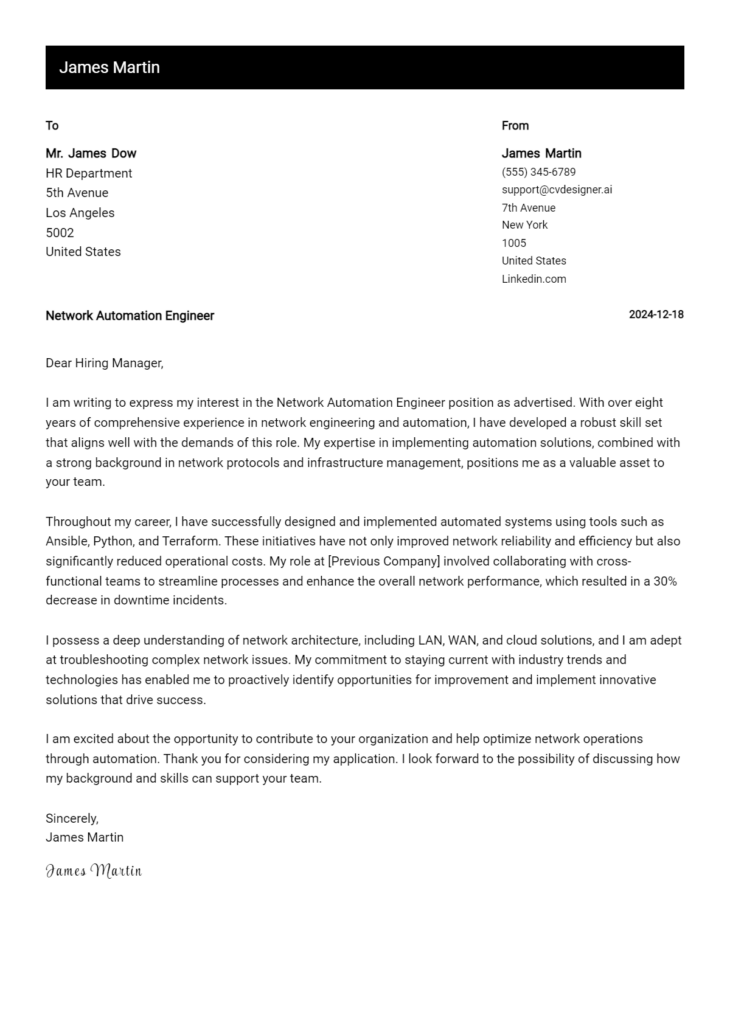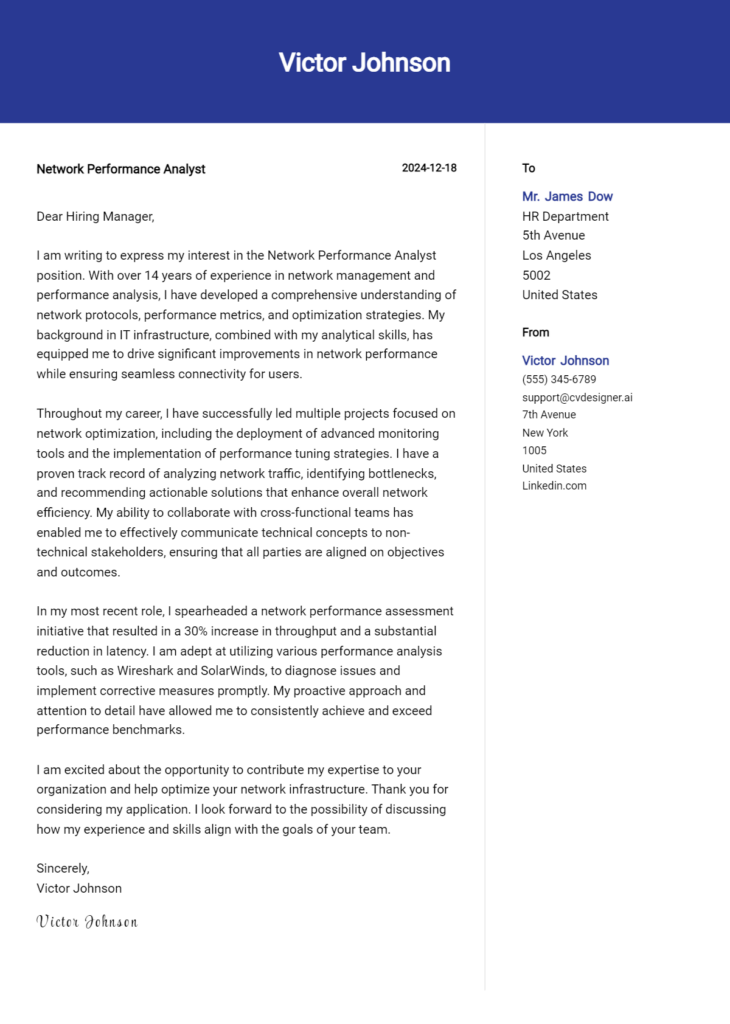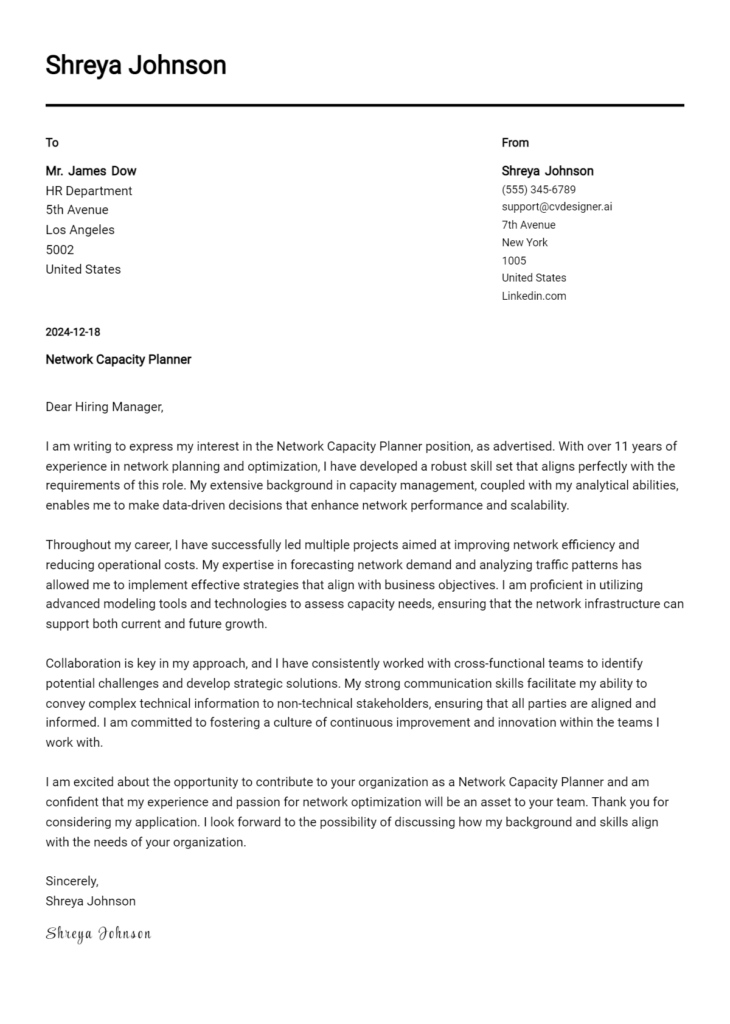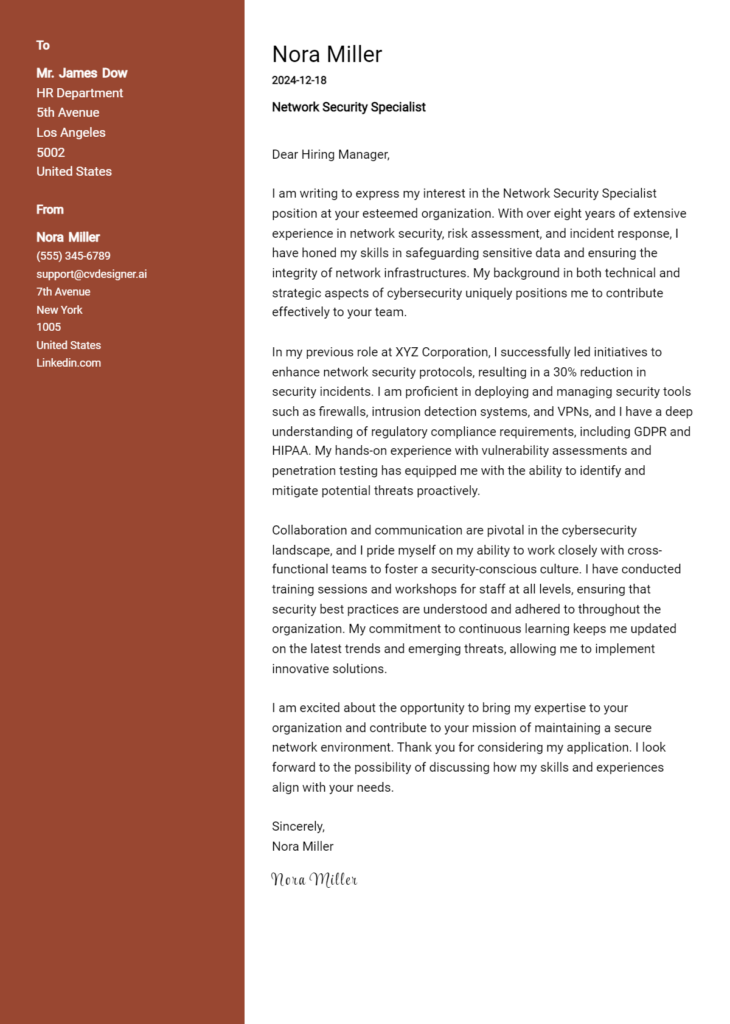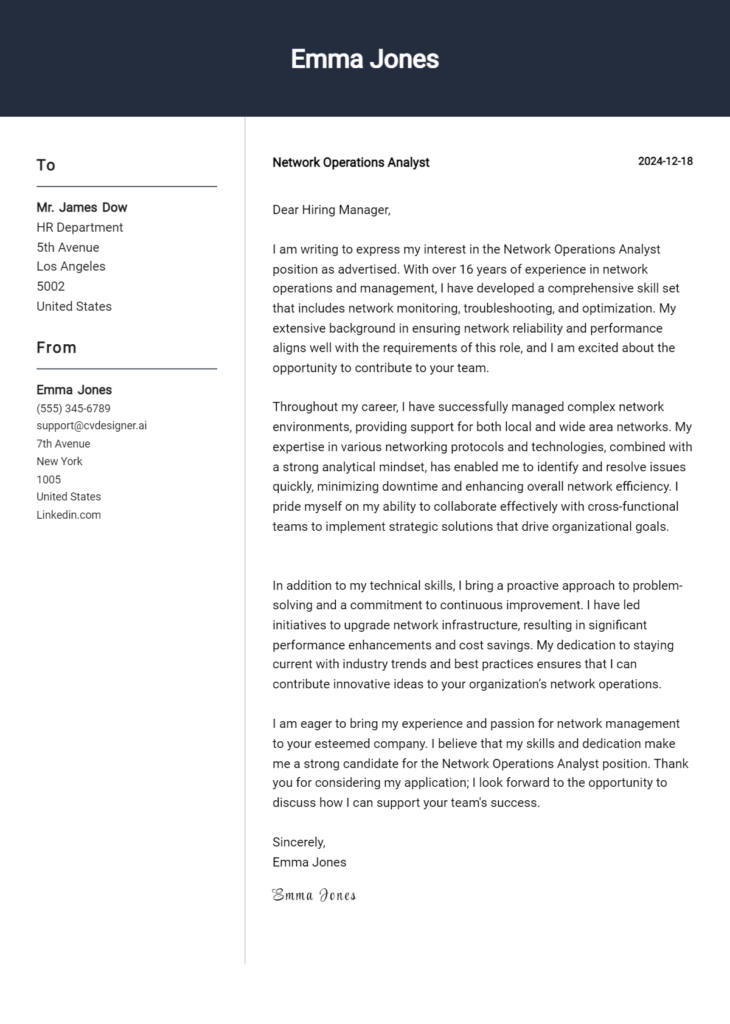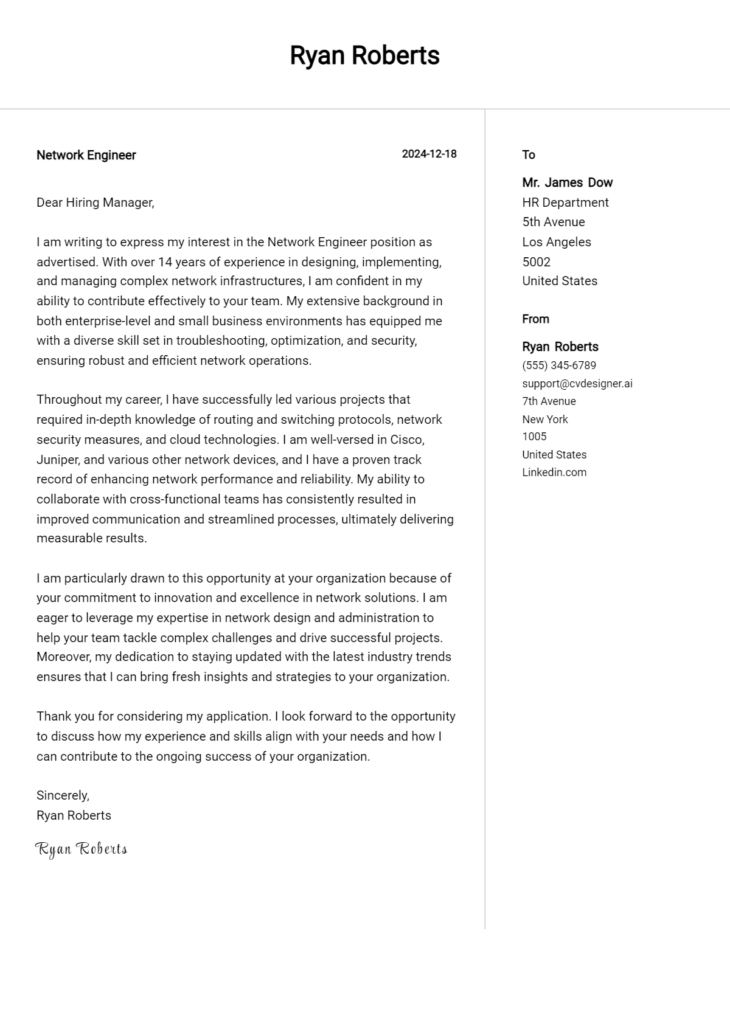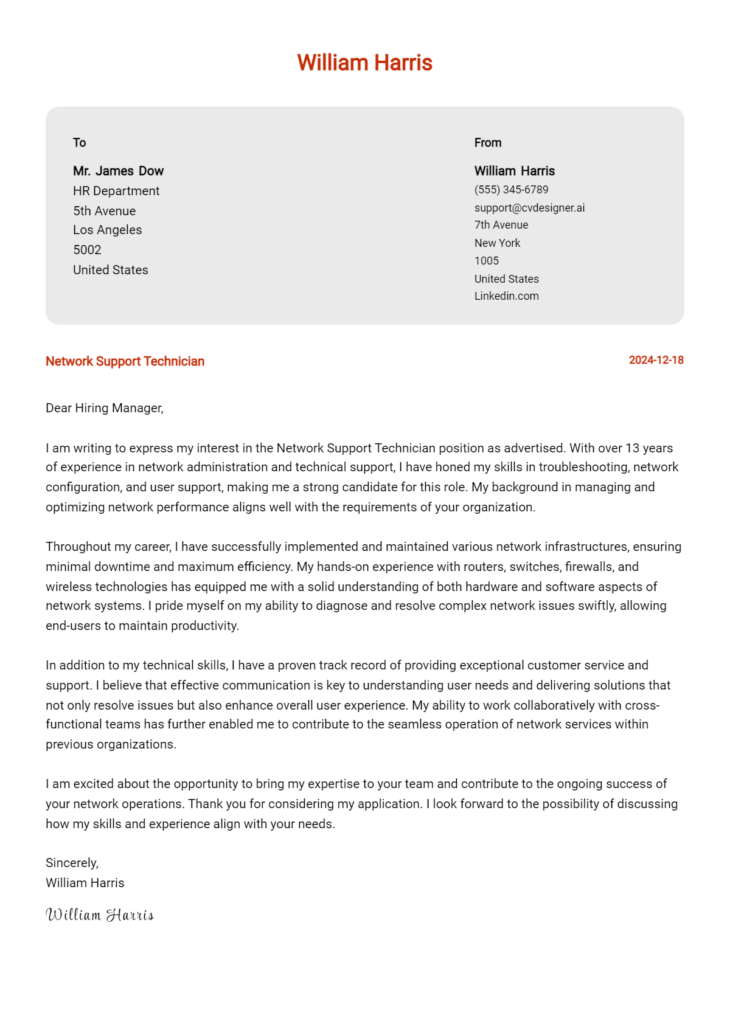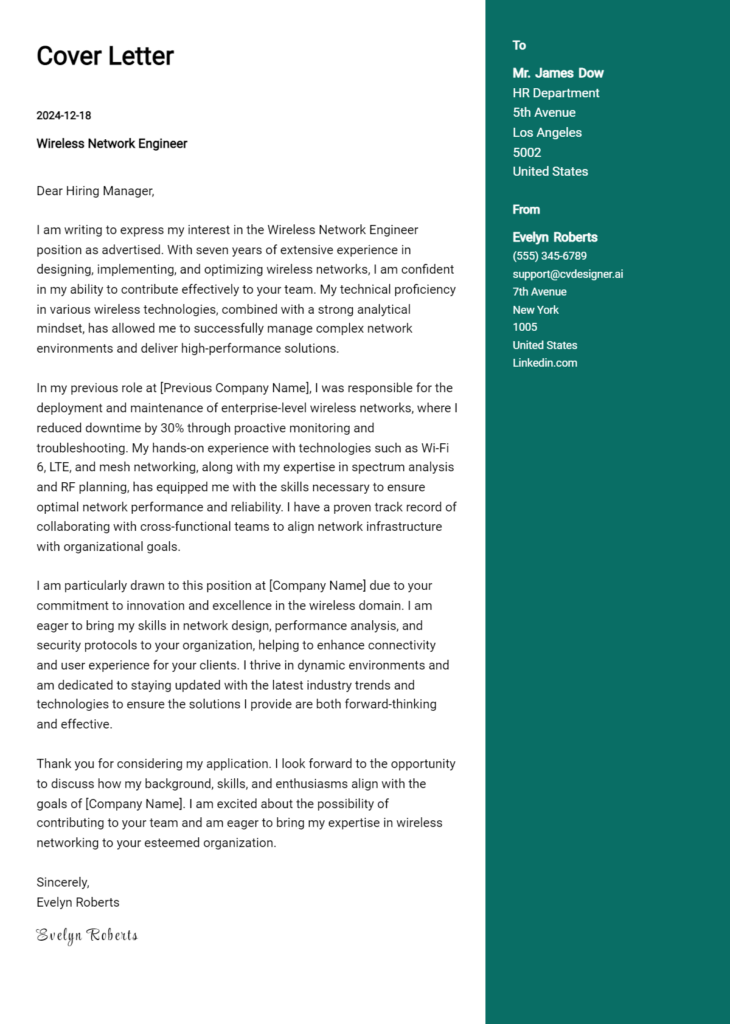Network Forensics Analyst Cover Letter Examples
Explore additional Network Forensics Analyst cover letter samples and guides and see what works for your level of experience or role.
How to Format a Network Forensics Analyst Cover Letter?
Crafting a compelling cover letter for a Network Forensics Analyst position is essential in demonstrating your technical expertise and analytical skills. The way you format your cover letter not only reflects your professionalism but also your ability to communicate effectively—skills that are vital in the field of cybersecurity. A well-structured cover letter captures the hiring manager's attention and establishes your credibility as a candidate who pays attention to detail and understands the importance of thorough investigation.
In this guide, we’ll outline how to structure your cover letter, providing insights and role-specific examples to help you create a standout document.
We will focus on the essential components of a professional cover letter, including:
- Cover Letter Header
- Cover Letter Greeting
- Cover Letter Introduction
- Cover Letter Body
- Cover Letter Closing
Each section is crucial for showcasing your qualifications and professionalism. Let’s delve into each part and explore how to make your Network Forensics Analyst cover letter shine.
Importance of the Cover Letter Header for a Network Forensics Analyst
The cover letter header is a critical component of your application as a Network Forensics Analyst. It sets the tone for your correspondence and provides essential information that allows the recipient to identify you and your intentions quickly. A well-structured header should include your contact information, the date, and the recipient's details, ensuring clarity and professionalism. This not only makes a positive first impression but also facilitates easy communication. A strong header demonstrates your attention to detail and your understanding of professional etiquette, both of which are crucial in the field of network forensics.
Strong Example
John Doe 123 Cybersecurity Lane Tech City, CA 90210 john.doe@email.com (123) 456-7890 October 15, 2023 Ms. Jane Smith Hiring Manager CyberSafe Solutions 456 Security Blvd Tech City, CA 90211
Weak Example
john doe email: johndoe@email.com 10/15/23 jane smith
The Importance of a Cover Letter Greeting
The greeting of your cover letter serves as the first impression you make on the hiring manager, establishing the tone for the entire letter. A well-crafted greeting not only demonstrates your professionalism but also conveys a sense of personalization that can set you apart from other candidates. Addressing the hiring manager directly shows that you have taken the time to research who will be reading your application, which reflects your genuine interest in the position. To avoid sounding generic, it’s essential to refrain from using clichéd greetings like "To Whom It May Concern." Instead, invest time in finding the recipient's name, which can often be found on the company's website, LinkedIn, or by calling the company directly.
Strong Greeting Example
Dear Ms. Johnson,
Weak Greeting Example
To Whom It May Concern,
The Importance of a Well-Crafted Cover Letter Introduction for a Network Forensics Analyst
A compelling cover letter introduction is essential for a Network Forensics Analyst position, as it sets the tone for the entire application and can significantly influence the hiring manager's perception of the candidate. The introduction should be engaging, capturing the reader's attention while also demonstrating the applicant's genuine interest in the role. Moreover, it should briefly highlight key skills or relevant achievements that showcase the candidate's qualifications and fit for the position. A strong introduction not only outlines the candidate's enthusiasm for the job but also establishes credibility, prompting the hiring manager to delve deeper into the application.
Strong Example
Dear [Hiring Manager's Name], As a dedicated Network Forensics Analyst with over five years of experience in cyber threat detection and incident response, I am excited to apply for the position at [Company Name]. My passion for uncovering hidden threats and my proven track record of successfully analyzing complex network data to prevent security breaches make me a perfect fit for your esteemed team. I am particularly drawn to [Company Name] due to your commitment to innovative cybersecurity solutions, and I am eager to contribute my skills in network traffic analysis and forensic investigation to uphold that mission.
Weak Example
Dear [Hiring Manager's Name], I am writing to apply for the Network Forensics Analyst position. I have worked in IT for a few years and have some experience with networks. I think I would be a good fit for your company.
Purpose of the Cover Letter Body for a Network Forensics Analyst
The cover letter body for a Network Forensics Analyst serves to effectively communicate the candidate's relevant skills, experiences, and overall value to the organization. This section is crucial as it allows the applicant to highlight specific projects or accomplishments that demonstrate their expertise in network security, incident response, and digital forensics. By providing concrete examples of past successes, such as identifying and mitigating security breaches or conducting thorough investigations that led to actionable insights, the candidate can convey their capability to contribute meaningfully to the company's objectives.
Strong Example
I am eager to bring my expertise to your team as a Network Forensics Analyst. In my previous role at XYZ Corporation, I successfully led a project where I identified a sophisticated malware attack that had gone undetected for weeks. By employing advanced forensic techniques and leveraging SIEM tools, I traced the attack vector, documented the findings, and collaborated with cross-functional teams to implement security measures that reduced similar incidents by 40% within six months. My analytical skills and hands-on experience in incident response will allow me to effectively protect your network infrastructure and enhance your security posture.
Weak Example
I am applying for the Network Forensics Analyst position. I have experience in IT and I know a bit about network security. In my last job, I worked with some security tools and helped out on a few projects. I think I can do a good job for your company.
Importance of the Cover Letter Closing for a Network Forensics Analyst
The closing paragraph of a cover letter is crucial as it encapsulates your qualifications, reiterates your enthusiasm for the position, and encourages the hiring manager to take the next steps, such as reviewing your resume or scheduling an interview. A strong closing leaves a positive impression and reinforces your suitability for the role of a Network Forensics Analyst, while a weak closing can undermine the overall impact of your application.
Strong Example
Thank you for considering my application for the Network Forensics Analyst position. With my extensive experience in network security, as well as my proficiency in forensic analysis and incident response, I am excited about the opportunity to contribute to your team. I am eager to bring my skills to [Company Name] and help protect your network infrastructure. I look forward to discussing my qualifications further and hope to schedule an interview soon. Please find my resume attached for your review.
Weak Example
I hope you like my cover letter. I think I would be okay at the job. Let me know if you want to talk.
These tips are designed to help candidates craft an effective cover letter for a Network Forensics Analyst position. A well-written cover letter is crucial for showcasing your technical skills, problem-solving abilities, understanding of the Software Development Life Cycle (SDLC), teamwork experience, and a passion for continuous learning. By effectively highlighting these qualities, you can make a strong impression on potential employers.
Cover Letter Writing Tips for Network Forensics Analyst
Highlight Technical Proficiency: Clearly outline your technical skills related to network forensics, such as familiarity with tools like Wireshark, Nmap, or EnCase. Mention any relevant certifications, like Certified Information Systems Security Professional (CISSP) or Certified Ethical Hacker (CEH), to demonstrate your expertise and commitment to the field.
Showcase Problem-Solving Abilities: Provide examples of specific challenges you have faced in previous roles and how you successfully resolved them. This could include situations where you identified security breaches or conducted thorough investigations into suspicious network activity. Quantifying your achievements can help illustrate your effectiveness.
Demonstrate SDLC Knowledge: Employers value candidates who understand the Software Development Life Cycle. Briefly discuss your experience with each phase of the SDLC, particularly in relation to network security and forensics. This shows that you can collaborate effectively with development teams to enhance security measures.
Emphasize Teamwork and Collaboration: Network forensics often requires working closely with other IT professionals, including system administrators and security analysts. Share examples of successful projects where you collaborated with others to achieve a common goal, highlighting your ability to communicate effectively within a team setting.
Express a Passion for Continuous Learning: The field of network forensics is constantly evolving, and employers appreciate candidates who are committed to staying current with emerging trends and technologies. Mention any recent courses, workshops, or conferences you’ve attended, or online learning platforms you utilize to further your knowledge in the field.
By integrating these tips into your cover letter, you can effectively present yourself as a strong candidate for a Network Forensics Analyst position. If you need additional guidance, consider exploring cover letter templates or utilizing a cover letter builder to streamline the writing process.
Common Mistakes to Avoid in a Network Forensics Analyst Cover Letter
Avoiding common mistakes in your cover letter is crucial for standing out as a Network Forensics Analyst applicant. Many candidates overlook essential details that could enhance their chances of landing an interview. Here are some common pitfalls to watch for:
Generic Content: Using a one-size-fits-all template can make your application seem insincere. Personalize your cover letter to reflect the specific job and company.
Neglecting Professional Language: Informal language or slang can undermine your credibility. Use professional terminology relevant to network forensics to demonstrate your expertise.
Lack of Specific Achievements: Failing to highlight relevant accomplishments can weaken your application. Showcase specific examples of your work in network security or forensic analysis to illustrate your skills.
Ignoring the Job Description: Not aligning your letter with the job requirements is a missed opportunity. Carefully read the job description and tailor your cover letter to address the key qualifications and responsibilities.
Poor Formatting: A cluttered or unprofessional format can detract from your message. Follow a clear cover letter format to ensure readability and professionalism.
Spelling and Grammar Errors: Typos can create a negative impression. Proofread your letter multiple times or use tools to catch any mistakes before submission.
Failure to Include a Call to Action: Not concluding with a strong call to action can leave your letter feeling incomplete. Invite the reader to discuss your qualifications in more detail, reinforcing your interest in the position.
By avoiding these mistakes and adhering to best practices, you can craft a compelling cover letter that showcases your qualifications effectively. For more inspiration, check out some cover letter examples tailored for various roles.
Cover Letter FAQs for Network Forensics Analyst
What should I include in my cover letter as a Network Forensics Analyst?
Your cover letter should highlight your technical skills and relevant experience in network forensics. Begin with a strong introduction that specifies the position you’re applying for and briefly explains why you’re a good fit. Include specific examples of your expertise in analyzing network traffic, identifying security breaches, and using forensic tools like Wireshark or TCPdump. Mention any certifications, such as Certified Information Systems Security Professional (CISSP) or Certified Information Security Manager (CISM). Lastly, express your enthusiasm for the role and how your skills align with the company’s goals in enhancing cybersecurity.
How can I demonstrate my analytical skills in my cover letter?
To effectively demonstrate your analytical skills, provide concrete examples from your past experiences. Discuss specific cases where you successfully identified and mitigated security threats, detailing the methodologies you used to analyze data. Use metrics to quantify your impact whenever possible, such as the percentage of threats neutralized or the reduction in response time. Highlight any tools you’re proficient with, including intrusion detection systems and log analysis software, to show your capability to analyze complex datasets. This tangible evidence will reinforce your analytical prowess and make your candidacy more compelling.
Should I tailor my cover letter for each application?
Absolutely! Tailoring your cover letter for each application is crucial in standing out as a candidate. Research the company and the specific requirements of the position, then align your skills and experiences with those needs. Mention the company’s projects, recent security initiatives, or industry reputation to show your genuine interest. Customizing your cover letter not only demonstrates your commitment to the role but also allows you to emphasize the most relevant aspects of your background, making a stronger case for why you’re the ideal fit for the position.
How can I address potential gaps in my experience in my cover letter?
If you have gaps in your experience, focus on your transferable skills and relevant coursework or certifications that can bridge those gaps. Explain how your previous roles, even if not directly related to network forensics, have equipped you with valuable skills such as problem-solving, attention to detail, and critical thinking. If you've engaged in self-study or completed online courses in cybersecurity or network analysis, mention these efforts to show your proactive approach to learning. Additionally, emphasize your enthusiasm for the field and your commitment to continuous professional development to reassure employers of your dedication.
Build your Cover Letter in minutes
Use an AI-powered cover letter builder and have your letter done in 5 minutes. Just select your template and our software will guide you through the process.

